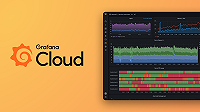Caution
Grafana Alloy is the new name for our distribution of the OTel collector. Grafana Agent has been deprecated and is in Long-Term Support (LTS) through October 31, 2025. Grafana Agent will reach an End-of-Life (EOL) on November 1, 2025. Read more about why we recommend migrating to Grafana Alloy.
loki.source.kubernetes
EXPERIMENTAL: This is an experimental component. Experimental components are subject to frequent breaking changes, and may be removed with no equivalent replacement.
loki.source.kubernetes tails logs from Kubernetes containers using the
Kubernetes API. It has the following benefits over loki.source.file:
- It works without a privileged container.
- It works without a root user.
- It works without needing access to the filesystem of the Kubernetes node.
- It doesn’t require a DaemonSet to collect logs, so one Grafana Agent could collect logs for the whole cluster.
NOTE: Because
loki.source.kubernetesuses the Kubernetes API to tail logs, it uses more network traffic and CPU consumption of Kubelets thanloki.source.file.
Multiple loki.source.kubernetes components can be specified by giving them
different labels.
Usage
loki.source.kubernetes "LABEL" {
targets = TARGET_LIST
forward_to = RECEIVER_LIST
}Arguments
The component starts a new reader for each of the given targets and fans out
log entries to the list of receivers passed in forward_to.
loki.source.kubernetes supports the following arguments:
| Name | Type | Description | Default | Required |
|---|---|---|---|---|
targets | list(map(string)) | List of files to read from. | yes | |
forward_to | list(LogsReceiver) | List of receivers to send log entries to. | yes |
Each target in targets must have the following labels:
__meta_kubernetes_namespaceor__pod_namespace__to specify the namespace of the pod to tail.__meta_kubernetes_pod_nameor__pod_name__to specify the name of the pod to tail.__meta_kubernetes_pod_container_nameor__pod_container_name__to specify the container within the pod to tail.__meta_kubernetes_pod_uidor__pod_uid__to specify the UID of the pod to tail.
By default, all of these labels are present when the output
discovery.kubernetes is used.
A log tailer is started for each unique target in targets. Log tailers will
reconnect with exponential backoff to Kubernetes if the log stream returns
before the container has permanently terminated.
Blocks
The following blocks are supported inside the definition of
loki.source.kubernetes:
| Hierarchy | Block | Description | Required |
|---|---|---|---|
| client | client | Configures Kubernetes client used to tail logs. | no |
| client > basic_auth | basic_auth | Configure basic_auth for authenticating to the endpoint. | no |
| client > authorization | authorization | Configure generic authorization to the endpoint. | no |
| client > oauth2 | oauth2 | Configure OAuth2 for authenticating to the endpoint. | no |
| client > oauth2 > tls_config | tls_config | Configure TLS settings for connecting to the endpoint. | no |
| client > tls_config | tls_config | Configure TLS settings for connecting to the endpoint. | no |
| clustering | clustering | Configure the component for when Grafana Agent Flow is running in clustered mode. | no |
The > symbol indicates deeper levels of nesting. For example, client > basic_auth refers to a basic_auth block defined
inside a client block.
client block
The client block configures the Kubernetes client used to tail logs from
containers. If the client block isn’t provided, the default in-cluster
configuration with the service account of the running Grafana Agent pod is
used.
The following arguments are supported:
| Name | Type | Description | Default | Required |
|---|---|---|---|---|
api_server | string | URL of the Kubernetes API server. | no | |
kubeconfig_file | string | Path of the kubeconfig file to use for connecting to Kubernetes. | no | |
bearer_token_file | string | File containing a bearer token to authenticate with. | no | |
bearer_token | secret | Bearer token to authenticate with. | no | |
enable_http2 | bool | Whether HTTP2 is supported for requests. | true | no |
follow_redirects | bool | Whether redirects returned by the server should be followed. | true | no |
proxy_url | string | HTTP proxy to send requests through. | no | |
no_proxy | string | Comma-separated list of IP addresses, CIDR notations, and domain names to exclude from proxying. | no | |
proxy_from_environment | bool | Use the proxy URL indicated by environment variables. | false | no |
proxy_connect_header | map(list(secret)) | Specifies headers to send to proxies during CONNECT requests. | no |
At most, one of the following can be provided:
no_proxy can contain IPs, CIDR notations, and domain names. IP and domain
names can contain port numbers. proxy_url must be configured if no_proxy
is configured.
proxy_from_environment uses the environment variables HTTP_PROXY, HTTPS_PROXY
and NO_PROXY (or the lowercase versions thereof). Requests use the proxy from
the environment variable matching their scheme, unless excluded by NO_PROXY.
proxy_url and no_proxy must not be configured if proxy_from_environment
is configured.
proxy_connect_header should only be configured if proxy_url or proxy_from_environment are configured.
basic_auth block
| Name | Type | Description | Default | Required |
|---|---|---|---|---|
password_file | string | File containing the basic auth password. | no | |
password | secret | Basic auth password. | no | |
username | string | Basic auth username. | no |
password and password_file are mutually exclusive, and only one can be provided inside a basic_auth block.
authorization block
| Name | Type | Description | Default | Required |
|---|---|---|---|---|
credentials_file | string | File containing the secret value. | no | |
credentials | secret | Secret value. | no | |
type | string | Authorization type, for example, “Bearer”. | no |
credential and credentials_file are mutually exclusive, and only one can be provided inside an authorization block.
oauth2 block
| Name | Type | Description | Default | Required |
|---|---|---|---|---|
client_id | string | OAuth2 client ID. | no | |
client_secret_file | string | File containing the OAuth2 client secret. | no | |
client_secret | secret | OAuth2 client secret. | no | |
endpoint_params | map(string) | Optional parameters to append to the token URL. | no | |
proxy_url | string | HTTP proxy to send requests through. | no | |
no_proxy | string | Comma-separated list of IP addresses, CIDR notations, and domain names to exclude from proxying. | no | |
proxy_from_environment | bool | Use the proxy URL indicated by environment variables. | false | no |
proxy_connect_header | map(list(secret)) | Specifies headers to send to proxies during CONNECT requests. | no | |
scopes | list(string) | List of scopes to authenticate with. | no | |
token_url | string | URL to fetch the token from. | no |
client_secret and client_secret_file are mutually exclusive, and only one can be provided inside an oauth2 block.
The oauth2 block may also contain a separate tls_config sub-block.
no_proxy can contain IPs, CIDR notations, and domain names. IP and domain
names can contain port numbers. proxy_url must be configured if no_proxy
is configured.
proxy_from_environment uses the environment variables HTTP_PROXY, HTTPS_PROXY
and NO_PROXY (or the lowercase versions thereof). Requests use the proxy from
the environment variable matching their scheme, unless excluded by NO_PROXY.
proxy_url and no_proxy must not be configured if proxy_from_environment
is configured.
proxy_connect_header should only be configured if proxy_url or proxy_from_environment are configured.
tls_config block
| Name | Type | Description | Default | Required |
|---|---|---|---|---|
ca_pem | string | CA PEM-encoded text to validate the server with. | no | |
ca_file | string | CA certificate to validate the server with. | no | |
cert_pem | string | Certificate PEM-encoded text for client authentication. | no | |
cert_file | string | Certificate file for client authentication. | no | |
insecure_skip_verify | bool | Disables validation of the server certificate. | no | |
key_file | string | Key file for client authentication. | no | |
key_pem | secret | Key PEM-encoded text for client authentication. | no | |
min_version | string | Minimum acceptable TLS version. | no | |
server_name | string | ServerName extension to indicate the name of the server. | no |
The following pairs of arguments are mutually exclusive and can’t both be set simultaneously:
ca_pemandca_filecert_pemandcert_filekey_pemandkey_file
When configuring client authentication, both the client certificate (using
cert_pem or cert_file) and the client key (using key_pem or key_file)
must be provided.
When min_version is not provided, the minimum acceptable TLS version is
inherited from Go’s default minimum version, TLS 1.2. If min_version is
provided, it must be set to one of the following strings:
"TLS10"(TLS 1.0)"TLS11"(TLS 1.1)"TLS12"(TLS 1.2)"TLS13"(TLS 1.3)
clustering block
| Name | Type | Description | Default | Required |
|---|---|---|---|---|
enabled | bool | Distribute log collection with other cluster nodes. | yes |
When Grafana Agent is using clustering, and enabled is set to true, then this
loki.source.kubernetes component instance opts-in to participating in the
cluster to distribute the load of log collection between all cluster nodes.
If Grafana Agent is not running in clustered mode, then the block is a no-op and
loki.source.kubernetes collects logs from every target it receives in its
arguments.
Exported fields
loki.source.kubernetes does not export any fields.
Component health
loki.source.kubernetes is only reported as unhealthy if given an invalid
configuration.
Debug information
loki.source.kubernetes exposes some target-level debug information per
target:
- The labels associated with the target.
- The full set of labels which were found during service discovery.
- The most recent time a log line was read and forwarded to the next components in the pipeline.
- The most recent error from tailing, if any.
Debug metrics
loki.source.kubernetes does not expose any component-specific debug metrics.
Example
This example collects logs from all Kubernetes pods and forwards them to a
loki.write component so they are written to Loki.
discovery.kubernetes "pods" {
role = "pod"
}
loki.source.kubernetes "pods" {
targets = discovery.kubernetes.pods.targets
forward_to = [loki.write.local.receiver]
}
loki.write "local" {
endpoint {
url = env("LOKI_URL")
}
}Compatible components
loki.source.kubernetes can accept arguments from the following components:
- Components that export Targets
- Components that export Loki
LogsReceiver
Note
Connecting some components may not be sensible or components may require further configuration to make the connection work correctly. Refer to the linked documentation for more details.



